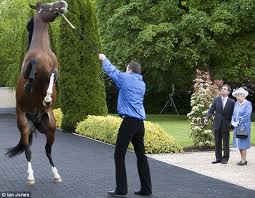3.20am and the buzzer from the alarm goes off. I bounce out of bed with unbridled enthusiasm ready for the days work ahead…..ha! Who am I kidding. I roll over and hit the snooze button. 3.30am and ten minutes after the first alarm off it goes again, for a moment you think about it but think the better of it and you drag yourself to the shower for a quick wake me up jolt of cold water. Ah yes another day in the life of a Stablehand has begun.
4am arrival at the track and grunting noises, the accepted form of greeting amongst co-workers, are exchanged between sips from the coffee cup. No matter what anyone tries to tell you, your body will never and is not suppose to wake up every day at 3.30am. Why do it one might ask? Now if you aren’t of the animal loving persuasion then chances are you will never quite understand the answer. For some waking up at absurd hours to pick up an animals manure for a basic wage seems like a bizarre concept. For some, its just part of life, second nature and even a dream come true. Rest assured you will work out in short time if this is for you for when that barn door swings open at 4am sharp its all systems go. Take one look down the row of some 30 odd stabling boxes with 30 long faces bobbing up and down in anticipation of their breakfast, if just for a second you overcome the shock of that 3.30am alarm just a hint of a smile registers on your face, then this may just be the career for you after all.
Thoroughbred race horses are a special breed. From the time they are foaled they spend nearly all their life in hand. Being an animal of prey their basic primary instinct is flight which in plain English is to run away really really fast. They have basic foraging skills, they can make their head touch the ground to eat pasture (that’s grass and hay not something you eat with carbonara sauce). So they will willingly accept a head collar and lead in return for shelter, dry bedding and hardy food. Amongst other things they are expensive to raise, expensive to feed and train and extremely prone to injuring both themselves and often the people around them. All of these nuisances create an overwhelming need for you, the Stablehand. On the upside they have the potential to make their owners large sums of money and shower them in glory. Alas most of this you will most likely never see. Still reading? Great, lets get back to the daily grind. The stable will generally have a variety of staff from different age groups and of varying level of expertise. At the top of the tree sits the head trainer for whom the stable is like his or her own business. The horses are either owned by themselves or clients they have lured to the stable generally by proving themselves as competent horsemen over a period of time. Immediately at their command will be a foreman or leading hand who will see to it that the daily set of tasks set out by the boss are carried out in an effective and timely manner. This type of position is one which you, as a Stablehand should aspire to hold if you are to one day run your own stable. A foreman’s morning duties will include checking each horses joints and various body parts once they are led to the saddling stalls by the Stablehand’s (maybe even you) each morning for exercise. Here he or she will saddle each horse up and assist the exercise rider in mounting the horse before issuing the trainers strict set of instructions for that particular horses morning regime. They will watch the horses gait as it trots off then return back to the stalls to repeat the process again with the next horse. Generally the head trainer will be positioned not to far a way, close enough to ensure everything is in order at the saddling stalls yet strategically poised to monitor and time his horse as it carries out its work. Basically, within yelling distance of everyone! The horse will exercise before exiting the track where it will be observed by the trainer before being led away by a stable hand to be hosed down scrapped dry and returned to its freshly cleaned box with a freshly mixed bin of feed and freshly topped up water that whilst all this has been going on the remainder of the Stablehand’s, (most likely you) will have attended to in good time and to the highest standard
You see stable staff are divided up and allocated a variety of tasks sometimes on a rotating roster, though often in order of seniority. Suffice to say on your first day in the stables your job will be to ‘muck out’ the boxes. This involves a process of attending to each individual stable, generally whilst the horse is out having its morning exercise, removing the manure, soiled bedding matter (generally sand or wood shaving) and rake the bedding level again. Often as a measure of who will get ‘promoted’ next, mucking out becomes a race between the rookie staff members, though be warned, you will feel the wrath of the foreman if in your haste, the boxes are not ‘mucked out’ correctly. Whilst you are busy racing your mate to get the boxes clean, another of the Stablehands will be topping up the water buckets whilst a more senior hand will have made up the horses feeds for the day and will be walking down the row carefully placing a bucket with each horses name or box number on it for you to place in the feed bin once you’re done. All horses have different eating habits and all trainers have different ideas on what is best for their horses. Generally speaking the horses will get two sometimes three feeds a day. Oh I forgot to mention that bit. These list of chores you’re attending to now, go home and have a few hours rest and we’ll see you again at 2pm. The horses bedding, water, feed and general well being are attended to twice daily leaving you just enough time for a short beauty sleep during the day and then of an evening a shower, the challenge of trying to stay awake during dinner before a crawl into bed to fall asleep 15 minutes into your favorite TV programme.
Although these jobs might seem repetitive and trivial its essential you note every detail and anything that is out of the ordinary is reported back to senior staff. You will hear talk like “Charlie left half a bin of feed last night boss” as staff empty the overnight waste from the feed bin or “Missy has hardly touched her water and looks like she has a dose of the scourers” in reference to a filly not drinking and having sloppy manure. Does the boss really need to know that? Most certainly he does. For if his star charge is not eating, drinking or is unwell, there’s no racing which means no prize money, which means cranky owners and cranky boss. So the sooner you report this, the sooner the vet can attend to it and the sooner the horse will be happy and healthy again. And same applies for boss. Rest assured that if you follow this logic then in short time you’ll be off the rake and you know what bucket and undertaking some of the more rewarding tasks the job offers.
On any given day you may be asked to get a horse out of its box for any number of practitioners to look at or work on. Farriers (they fix the feet and change the shoes), veterinarians, chiropractors, masseuses even acupuncturists to name just a few will all be required at different times to attend to these equine athletes. As a Stablehand you will have exposure to people with all kinds of occupations and you will generally find that at one point or another these people have in fact worked in the very same role you are now. A basic knowledge of caring for horses is a must for the multitude of trades and occupations that flow outward encompassing the racing industry.
The real joy comes raceday. Depending on where you’re stabled and where your horse is racing this can mean a walk across the road to the local track or 5 or 6 hours each way towing a float or in a truck. You take the good with the bad. Stablehands become Strappers on raceday. And as a Strapper your are not only expected to turn the horse out in fine order, well you’re expected to do the same yourself. So a good set of boots, clean set of clothes and more than 30 seconds in the shower are a must. Finish off with some deodorant and a comb and you’re good to go. As for the horses shampooing, brushing, pulling and trimming maines and tails are all part of the preparation for a raceday. Your horse should leave the stable in fine order and its your job to make sure they stay that way until they are under starters orders. For the owners, that’s the folk who are helping pay your wages, flock to the track on raceday to see their champion in action. And they want to feel safe in the knowledge that all that money they’ve been handing over to your boss is going somewhere and soon going to come back to them in droves. The latter is rarely true but the former is what you’re getting paid for and if you’re lucky every now and again the latter might come true. Now I’ve seen and done plenty of things in my time, but rest assured I can tell you that as a Stablehand or Strapper if you will, there is no better I repeat no better feeling in all the world than seeing your horse cross that finish line first. And for that one moment however short it may be, every piece of manure, every bucket of feed and every 3.30am alarm that rang in your ear suddenly seems all worthwhile.
But back to reality, chances are your horse will run middle of the pack, you hose him down, scrape him dry, he’ll stand on your foot and bite you on the backside before you give him a drink of water, load him on the truck for that six hour truck ride home. And the best thing you can hope for is falling asleep, catching up on some much needed shut eye and dreaming about the day he really does cross the line first.


